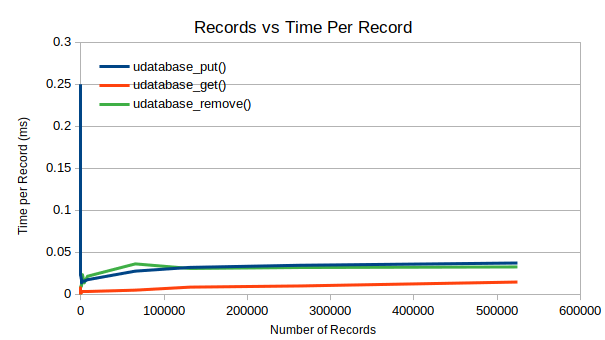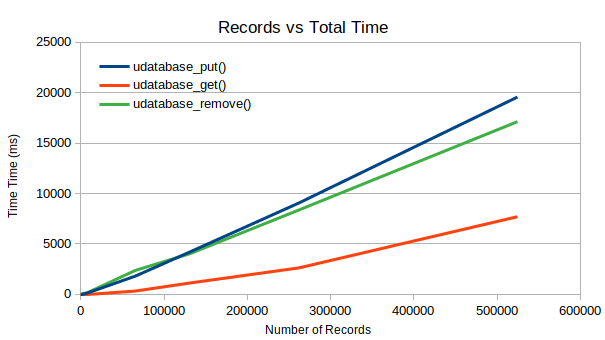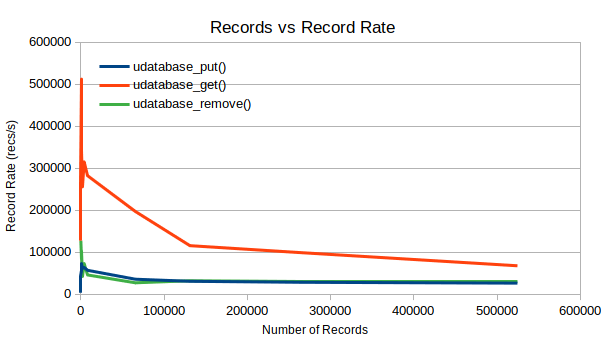 Coffee Space
Coffee Space 

A little while ago I create uDatabase, an open source micro flat-file database in under 256 lines of C code.
The intention is to use uDatabase as pat of the new dead social successor. Before using it for such a project, I wanted to hack together a simple example project to put it through it’s paces.
Enter simple notes, an unreleased project to write basic notes in the browser and have them saved to the database. As a result of this development, uServer got a file location bug fix and a new feature for reading form data.
The problem is, that when saving significant amounts of data, it would sometimes get concatenated. Dropping data is far from ideal when you’re entire purpose as a library is to store data! Ouch!
Currently, we test the code by writing random entries as follows in
main.c
in the function testPut():
0001 int64_t testPut(struct uDB* db, int width, int num){
0002 srand(0);
0003 char* k = malloc(32);
0004 char* test = malloc((width * 4) + num);
0005 for(int x = 0; x < (width * 4) + num; x++) test[x] = (char)rand();
0006 int64_t putStart = currentTimeMillis();
0007 for(int x = 0; x < num; x++){
0008 char* v = test + x;
0009 sprintf(k, "%x", x);
0010 int n = width * ((x % 4) + 1);
0011 if(udatabase_put(db, k, v, n) < 0){
0012 fprintf(stderr, "Failed to insert key=%s\n", k);
0013 }
0014 }
0015 return currentTimeMillis() - putStart;
0016 }
We then check that this data is read back afterwards with
checkPut():
0017 int64_t checkPut(struct uDB* db, int width, int num){
0018 srand(0);
0019 char* k = malloc(32);
0020 char* test = malloc((width * 4) + num);
0021 for(int x = 0; x < (width * 4) + num; x++) test[x] = (char)rand();
0022 int64_t putStart = currentTimeMillis();
0023 for(int x = 0; x < num; x++){
0024 char* v = test + x;
0025 sprintf(k, "%x", x);
0026 int n = width * ((x % 4) + 1);
0027 char* val = udatabase_get(db, k);
0028 if(val != NULL){
0029 if(memcmp(val, v, n) != 0){
0030 fprintf(stderr, "For x=%i, key=%s, reading entry of length=%i\n", x, k, n);
0031 break;
0032 }
0033 free(val);
0034 }else{
0035 fprintf(stderr, "For x=%i, key=%s, reading entry of length=%i\n", x, k, n);
0036 fprintf(stderr, "Failed to read back value for x=%i\n", x);
0037 }
0038 }
0039 return currentTimeMillis() - putStart;
0040 }
The data to be stored, n, is calculated as
,
where width is
(1008). We conveniently store neatly sized blocks in the database, and I
believe this is where we come unstuck.
The first task is to try and replicate this issue in our automated
testing. This initially will involve having a variable length
put() and get() operation. To achieve this we
can change the following:
0041 int n = width * ((x % 4) + 1); // existing
To the following variable width version:
0042 int n = width + (x % (width * 3)); // new
Re-running, we get the following error:
0043 For x=1, key=1, reading entry of length=1009
This tells us that the problem starts at length 1009. This is triggered with the following code:
0044 if(memcmp(val, v, n) != 0){
0045 fprintf(stderr, "For x=%i, key=%s, reading entry of length=%i\n", x, k, n);
0046 break;
0047 }
We comment that break, re-compile, re-run and now see:
We now get the following errors (which I’ve reduced for the purpose of
readability):
0048 For x=1, key=1, reading entry of length=1009 0049 [..] 0050 For x=1007, key=3ef, reading entry of length=2015 0051 For x=1009, key=3f1, reading entry of length=2017 0052 [..]
Note that skip over exactly where our testing blocks are, sigh. It appears the problem is exactly as bad as I thought it would be.
My suspicion is that the problem here is insertion.
udatabase_put() looks like follows:
0053 /**
0054 * udatabase_put() Store value using key. No check if the key already exists.
0055 * @param db The database description.
0056 * @param k A NULL terminated key string to be used to insert a value.
0057 * @param v A string to be inserted into the database.
0058 * @param n The length of the string to be stored.
0059 * @return The success of the insertion, 0 if success.
0060 **/
0061 int udatabase_put(struct uDB* db, char* k, char* v, long int n){
0062 char hash[UDATABASE_HLEN];
0063 udatabase_shash(k, hash, UDATABASE_HLEN);
0064 long int toff = udatabase_remove(db, k, hash); // NOTE: Remains locked.
0065 if(db != NULL && db->fp != NULL && memcmp(hash, UDATABASE_NULL, UDATABASE_HLEN) != 0){
0066 fseek(db->fp, 0, SEEK_END);
0067 if(toff >= 0){
0068 db->table[toff] = ftell(db->fp);
0069 }else{
0070 long int t = -1;
0071 while(++t < db->tableLen && db->table[toff = *(uint16_t*)hash + (UDATABASE_KLEN * t)] >= 0);
0072 if(t < db->tableLen && toff >= 0){
0073 db->table[toff] = ftell(db->fp);
0074 }else{
0075 toff = -1;
0076 }
0077 }
0078 long int x = 0;
0079 while(x < n && v != NULL){
0080 fwrite(&hash, 1, UDATABASE_HLEN, db->fp);
0081 x += fwrite(v + x, 1, (n - x) % db->dWidth != 0 ? (n - x) % db->dWidth : db->dWidth, db->fp);
0082 }
0083 while(x++ % db->dWidth != 0) fputc('\0', db->fp);
0084 }
0085 pthread_mutex_unlock(&db->lock); // NOTE: Unlock from remove() call.
0086 return toff >= 0 ? 0 : udatabase_service(db);
0087 }
The interesting code for us is the following (with my added comments about what it is supposed to do):
0088 long int x = 0; // Offset into the data written
0089 while(x < n && v != NULL){ // Keep write out until we write everything
0090 fwrite(&hash, 1, UDATABASE_HLEN, db->fp); // Write the hash for the data
0091 /* Write the largest block we can */
0092 x += fwrite(v + x, 1, (n - x) % db->dWidth != 0 ? (n - x) % db->dWidth : db->dWidth, db->fp);
0093 }
0094 /* If we finish before the end of the, fill with zeros */
0095 while(x++ % db->dWidth != 0) fputc('\0', db->fp);
What we’ll do is process these values manually. We have two cases we
can test, n = 1008 (works) and n = 1009
(doesn’t work). The variables we’ll manually test are:
n = 1008 and 1009.UDATABASE_HLEN = 16.db->dWidth = 1008.For the case of 1008:
x = 0, n = 1008.
x < n == true, continue.v + x == v, n - x == n,
n = 1008. (n - x) % db->dWidth == 0,
therefore write out length of db->dWidth.x += db->dWidth.x == db->dWidth == 1008 == n, therefore stop
looping.x % db->dWidth == 0, therefore end writing.The case for 1009 is a little more complicated:
x = 0, n = 1009.
x < n == true, continue.v + x == v, n - x == n,
n = 1009. (n - x) % db->dWidth == 1,
therefore write out length of (n - x) % db->dWidth == 1.
Oh dear.In the write-out line, instead of writing
(n - x) % db->dWidth, we should instead be writing out
as much as we possibly can to fill the block. We should change this
to:
0096 x += fwrite(v + x, 1, (n - x) <= db->dWidth ? (n - x) : db->dWidth, db->fp);
And now we pass tests!
As you can see in the following graphs, this has had little to no effect on the performance when compared to the previous results.

One thing worth noting is the reduced get() time. I
would need to investigate this further to figure out why - but I’m not
complaining.

Other than this, things look normal.

Some take-away points: